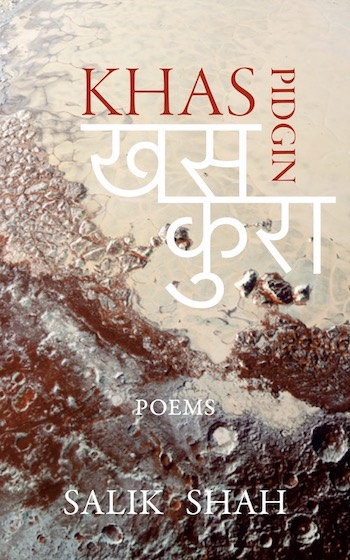
Poetry is the language of the soul. In translation, what does it become? Khas Pidgin is a poetic memoir of an alien non-native speaker in both Nepali and English.
Available to purchase at Amazon.com: Kindle & Paperback. Apple/iTunes Store: iBooks.
Biographical Note
Salik Shah is a science fiction and fantasy writer, editor and film director based in New Delhi. He is the founding editor and publisher of Mithila Review, a quarterly journal of international science fiction and fantasy. He grew up in Kathmandu and New Delhi.
About
As an ethnic Indian boy, who grew up in Kathmandu as an outsider, my early encounters and experiences of subjugation and disfranchisement continue to haunt and shape my work, including my debut speculative poetry chapbook, “Khas Pidgin,” and an illustrated poetry book “The Story of India’s Partition.”
In realistic science fiction and fantasy settings, I explore themes of exile and wounds of borders in my short stories, “Shambhala” (Gollanz), which is set in Chinese-occupied Tibet, and “Lakhen and Dragonflies” (La.lit Magazine), where Nepal is now under official rule of India following Chinese invasion.
My parents spoke in Maithali, but never so much with us; I grew up speaking Khas-Nepali at home because of my schooling, but after I left Kathmandu, English become my primary tongue. That doesn’t mean English came naturally to me; it requires some effort, hence the title of my poetry chapbook: “Khas Pidgin.”
Following the recent civil unrest and violence in the Terai belt of the former Himalayan kingdom, it became very clear to me that I had to speak up about my past experiences and traumas so that people know about the widespread racism which exists in the subcontinent, through the medium that came most naturally to me: poetry and fiction.
Soon Mithila Review was born out of the quest for dignity and justice; “Khas Pidgin” would take one more year of preparation and work.
“Most of the Khas-Nepali poems collected here were written in Kathmandu before 2005. These early poems possess a kind of raw intensity and emotional authenticity that do not come easily to a poet focused solely on style, excellence in craft. The attempt to translate these proved to be a challenging experience—they fail, obviously, if translated word by word. The earliest works of a poet may not be excellent, but they serve a critical, social or historical function; they help us re/discover the lost, suppressed or forgotten ways and territories of their being in their contemporary society, and the world.” (– from the introduction to “Khas Pidgin”)
CONTENTS
Foreword
Acknowledgements
PART 1: POETRY IN ENGLISH
Straw-Fitted Elephants, Histories, Field Notes, After Stonehenge, Blast Fishing, Exile, Prayer, At Rajiv Chowk Metro Station, Khas Pidgin, Foreign Tongue, The City Was Missing, How to Appropriate Exotica, Fists of Hope, Seismologists from Hastinapur, City Planning After Quake, Love Particles, A Fourteen-line Poem on Separation, Which species of bird is a drone?, Child Soldiers, DDC Milk, The Last Scan, Channel Earth, and Electrocution
PART 2: POETRY IN NEPALI WITH TRANSLATION
Heart’s Wish (मनोकामना), Buddha Spirited (धर्म वीर), Tonight (आज राती), City (एउटा शहर), Revolution (परिवर्तन), Prisoner (बन्दी), Friends (दुई सखी), Romance (माया), Sakambari (सकम्बरी), Sinner (पापी), Report (रिपोर्ट), Wailing (कोहराम), Alive (काँचुली), and Plan (प्रेरणा)
Available to purchase at Amazon.com for Kindle (mobi). Apple/iTunes Store: iBooks.